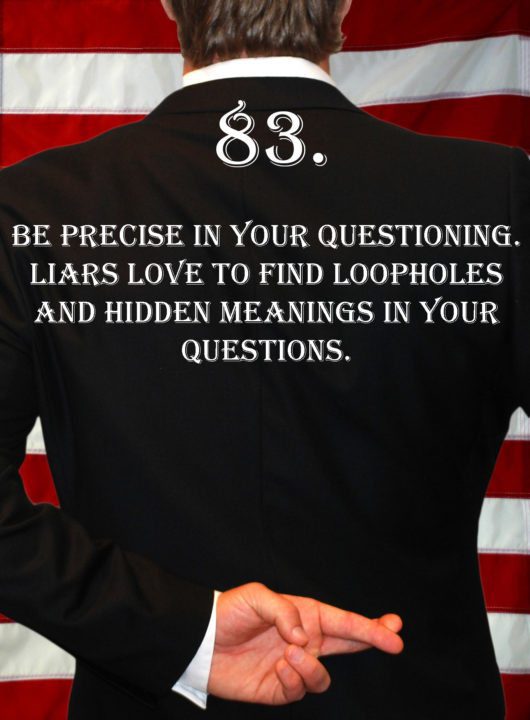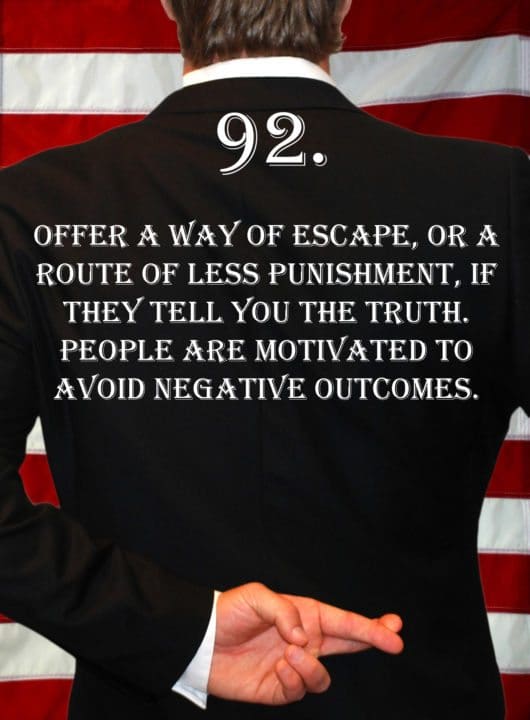
Deception Tip 83:
Be precise in your questioning. Liars love to find loopholes and hidden meanings in your questions.
Listen To The Podcast!
E83 – Be Precise – Deception Tips Podcast – Click Here To Subscribe
Podcast Transcript
Hello and welcome to the Deception Tips podcast where you will learn amazing cues to detect deceit that will help you read people like never before. I’m your host Spencer Coffman, let’s get started.
Hello and welcome to Deception Tip episode number 83. Last week, we had a very interesting conversation or discussion, one-way talk really, I was talking, you were listening.
We talked about how you should begin your interrogations or how you should use your interrogations to get more responses. Not only interrogations but we’re talking interactions with people in which you need some information.
So, even though it may not be the stereotypical interrogation where you sit someone down on the other side of a steel table, handcuff them down, and put them in a chair.
You’re on the other side pacing around or you’re behind them or moving, trying to figure out what really happened. No, this can be in any instance where you have a few questions that you need to have answered by someone.
So, what you do is just like we talked about last week, start some sentences with the word ‘you’, and you can end up with suggestions or questions. What does that look like?
Well, there are a variety of different ways but in reality, it’s really simple. You did this and then what?’ ‘You went down to the park last night at 10 o’clock then what happened?’ Start them out with ‘you’, insinuate something, and then allow them to finish the story.
In addition, you can use suggestions such as ‘you flew off the handle, things got out of control and someone wound up dead’, something like that. You can kind of accuse them directly of whatever it is that you need to find out. ‘So, you just got a little carried away and all of a sudden, the merchandise was in your pocket and you walked out the store’.
You can accuse them of these things to get them to fess up. Remember, it’s a little bit of a play on accusing them of larger crimes to get them to admit to the smaller crimes.
We talked about that before in an earlier deception tip, I encourage you to go back and check them out, listen to that one as well. In case you don’t remember, that was episode number 26, conveniently titled Accusing Liars.
Today, we’ve got another tip, no surprise, this one is a general statement, it is something that you must use in all of your questioning and interrogation techniques.
You should always use it in general, this should just be a regular part of your speech and vocabulary. This is a method that should become part of your nature, it really is the simplest way, it’s like a yes or no question.
Well, it can either be ‘yes’ or ‘no’, it doesn’t get any easier than that, it’s cut and dry. So, this is a method or behavior, it’s a characteristic that you must display, and that will really help you to find out what you want to know and really hone in and get the answers you’re looking for. We’re talking about Being Precise, it’s very important that you make sure you know what you’re asking.
Also, make sure that whoever you’re asking knows what you’re asking. Your questions need to be clear and direct, they cannot be wayward and all around and you need to have a mixed.
You’ve got to have some open-ended questions and some close-ended questions. You need to have a well-rounded interrogation technique or questioning technique and it needs to be very clear what you are trying to find.
So, here it is, this is deception Tip number 83. Be precise in your questioning, liars love to find loopholes and hidden meanings in your questions. Here it is again, Deception Tip 83. Be precise in your questioning, liars love to find loopholes and hidden meanings in your questions.
Liars love to find these hidden meanings. When they lie, they’re already being deceptive, therefore, they are trying to get away with something. Remember they’re under a tremendous amount of stress and tension, they’re anxious, they have a huge battle going on inside them. Remember the conscious and the unconscious are fighting back and forth.
Which one wants the truth? The unconscious. The unconscious is pushing hard to leak the truth at every chance it gets. The conscious is more self-serving and it really wants to get away with the lie, so those two are fighting head to head.
There’s all this animosity and tension boiling up inside someone. Remember, they’re also thinking about getting the lie right because they want you to believe the lie.
In addition, they’re really worried about getting caught. What is the consequence if someone finds out what they did? Then what’s the consequence if someone finds out they’re lying about what they did?
Now there’s a double consequence, not only are they going to get in trouble for lying but they’re also going to get in trouble for the behavior that they were lying about.
In addition, they’re trying to convince themselves of the lie because it’s a lie. So, they’re trying to go over and over and over in their head, rehearsing it, practicing, making sure that they can get away with this.
They want to believe it themselves then they want someone else to believe it. Not only do they need you to believe it but they also need to have everyone else around you believe it.
Whoever else they tell, they need to make sure they remember that story. It could be their friend, it could be their coworker, it could be the police, it could be whoever they need to lie to.
The one that really matters, whoever’s interrogating or questioning them, so there are a lot of people that need to believe that lie, the stress, the tension is immense.
Not only that but they cannot forget that lie, they have to remember it forever, it’s just so much to handle it can be overwhelming and it is overwhelming. Therefore, behavioral leakage things happen.
In addition, when you’re questioning them, a liar who may not be fully convinced or who wants to dodge things will make sure to take advantage of any questions that aren’t that great such as evading them or answering them differently.
Such as ‘tell me where you were last night’. ‘Well, I was at home’. Well, good but you didn’t say when, I was only at home for five minutes last night, but I was out for the rest of the night and I didn’t get home until 5:00 AM the next morning.
So, you could miss all of that, make sure your questions are very precise and specific. Where were you last night between the hours of 10:00 PM and midnight?
Now we’re talking, you honed it in, you honed it down, you got specific and precise because if someone is really trying to get away with something, and if they are good, they will find every loophole.
They will answer your questions invasively and they will talk with information that you do not know if it’s good or bad or what it is. Especially if someone has been trained in interrogations or counter interrogations or anything like that.
If they have been taught how to successfully give what I like to call non-answers. So, it’s answering the question but it’s not really an answer and I’m phenomenal at this.
You just ask anyone that knows me and they’ll say that Spencer is the best person to change subjects or evade questions or answer people and satisfy their curiosity and then by the end of the conversation, they didn’t find anything out.
There are a lot of people out there like that, well, not a lot out there like that but there are some so be aware of them. We’re going to talk a lot more about how you can answer your questions and phrase your questions and really get the truth out of people, coming up right after this.
Want to be a lie spotter but don’t have time to do the research? Check out Spencer Coffman’s Deception Tips blog and learn how to detect deception, you’ll be an expert at detecting lies. That’s spencercoffman.com.
Welcome back to Deception Tip episode number 83, where we are talking about how important it is for you to be precise in your questioning. You need to be specific. You need to have really narrowed down, honed in questions that do not allow a lot of room for evasiveness or extra answers.
Keep in mind that you still need to have open-ended questions, which allow people to give you a verbal response, it’s a long narrative response. ‘Tell me about what happened the other day’, something like that. ‘Tell me about your family’ or ‘what’s your home life like?’ Things like that that allow people to talk and get them to volunteer more information, that’s an open-ended question.
A close-ended question, we’ve talked about them before, that’s like a ‘yes’ or a ‘no’ question. ‘How are you doing today?’ ‘Good’, ‘where were you last night?’ ‘Home’, things like that that are very close-ended or stuff like, ‘are you wearing a blue shirt today?’ Yes, or no, it’s a yes or no question. Those are closed-ended, they do not allow a lot of room for the person to explain or to expand on the answer.
You need to have a combination of all of those questions. In addition, when you’re asking more open-ended questions, you need to make sure they’re specific. If you ask a general open-ended question, someone could run away with it for a very long time and just talk and talk and talk but really you didn’t need all of that information, you were looking for some specific information.
At times, it can be good to allow them to talk about that because maybe they don’t know what you’re looking for. Then you allow them to talk and you sift through whatever they said to find what you’re looking for.
Other times, you may need to be specific, ‘where were you last night between 8:00 PM and 10:00 PM?’ Boom, specific. Those types of questions really allow the person you’re asking to give a direct, definite answer.
You need to make sure that you are precise in those and keep in mind the loopholes, liars are always looking for loopholes and ways around the question. Things like, ‘what do you do for a living?’ ‘As little as possible’.
Okay, that was a great answer and you might get a chuckle out of it and some people might be satisfied with it. They might say, ‘yeah, me too, I try to do this’.
Then all of a sudden, they’re talking, you can see this a lot, in fact, practice it with other people. When someone asks you a question, you can do this, someone says, ‘well, what do you do for a living, Ken?’ ‘Well, I try to do as little as possible’ then the guy who asked the question will, ‘ha ha, yeah, me too. As a matter of fact, last week…’, boom, boom, boom, on and on.
Pretty soon they’re telling you about their job and you didn’t even answer their question and now you’re onto the next topic without them even knowing it. A non-answer, those happen all the time and you need to be careful about those because most people, and I’m going to say 80% of the people are like the person who asks Ken the question right there.
What do you do for a living? As little as possible, boom, and then they jump on it and now they give you the whole story about their situation at work last week, and they forgot their question.
Now nothing got answered but did it matter in that instance? No, but if they were trying to find the truth, they just shot themselves in the head because they did not get it.
80% of the people are like that, so you need to make sure if you’re asking people questions, have a direct and clear focus in mind. Do not let them give you a non-answer. If they give you a non-answer, rephrase the question and ask it again and keep coming back to it, you need to have that clear agenda.
If you don’t have that agenda, you are going to get lost because they are going to fill you with so much stuff and so many answers that you’re going to forget what you were asking in the beginning. Then you’re going to leave there and be like, wow, that was a good conversation, it lasted two hours, I got a lot of information.
You’re going to go back and look at all this information and you’re going to be like, I didn’t get the information I wanted. They ran you around the Rosebery Bush time and time again and you continued to talk and ask different questions and you didn’t have an agenda, therefore, make sure you are very precise and specific.
Even if you’re asking open-ended questions and closed-ended questions, you need to know what you want out of that situation. What you’re looking for in that interrogation or whatever it is, you need to have that outline. Then you can allow your questioning to point down that road. Even if you take some scenic routes or a detour, you need to always be coming back to your focus points.
What are you hoping to learn? Again, you can use a combination of questions but be on the lookout for those non-answers, those evasive questions, because that’s something that a lot of people will give you, especially when they’re lying.
‘What’s your favorite flavor of ice cream?’ ‘Well, I love ice cream, it’s so good, I really like a lot of the different flavors, which one do you like?’ ‘Oh, I love chocolate, it’s really…’ ‘Oh, great, where do you get it?’
Now all of a sudden, who’s asking the questions? They just turned the tables on you and now you’re responding to their questions, it happens all the time.
You saw how flawlessly that transition was? You can notice this in other people’s conversations and in your own. People who are really good at speaking, the silver tongues out there, they are phenomenal at switching the tables on you.
They get you to start answering more questions and you really wanted to ask the questions. As I said, you talked to anyone I know and they’ll tell you that I’m a master at it.
You need to pay attention to that, listen to those people, watch out for them and make sure that you have a clear agenda in your questioning so that you know that you’re going to make it to whatever answer you need.
I want to thank you for listening to this week’s episode of the Deception Tips podcast. I hope that you’ll share with your friends, subscribe to the feed, check out the deception tips videos, the blog, and take a look at the books I have available and, as always, tune in next week for a new deception tip.
Video Transcript
Hey guys, my name is Spencer Coffman, thank you for watching the deception tips videos. They’re all about teaching you how to read people and detect deception so that you will be able to tell if someone is lying to you. Today, we’re going to talk about how you need to converse with someone who is being deceptive in your line of questioning or in what you’re trying to find out.
Remember, liars like to talk and if they’re lying, they’re going to continue lying, so you need to hone in and be precise in what you’re saying so that you know what their answers are going to be. You cannot give them any wiggle room to run away with things or to get off on tangents. You need to have that direct line of questioning, but you also need to encourage them to give you a narrative.
When they’re giving their narrative, their story, there is going to be a lot more body language in there and there’s a lot more that you can see rather than just asking simple ‘yes or no’ questions. So, here we go, this is Deception Tip number 83. Be precise in your questioning. Liars love to find loopholes and hidden meanings in your questions.
So, being precise in your questioning is something that we’ve talked about a little bit before with ‘yes or no’ answers and ‘yes or no’ questions. If you’re going to ask someone a ‘yes or no’ question, the answer is ‘yes or no’, so anything else they say is like, dude what are you talking about, yes or no, get to the point.
Again, that can be good and bad, it’s good because you need a direct answer, it’s bad because you want to encourage a liar to talk more so you can get more opportunities to see different body language signs and different things of deception, expressions, etc. You need to be precise in your questioning because these liars, if they’re good at it, they’re great with non-answers and loopholes.
A lot of times, you ask these questions to people and they could turn it around and ask you a question. If you’re not paying attention, all of a sudden, you’re answering this question and it’s like wait a minute, who’s asking the questions here? Well, they’ve completely converted the conversation so they’re in control, that’s bad.
Another thing that they could be doing is if you’re asking them questions, a typical example, I believe I’ve used this one before, when things are frustrating, how do you feel? Well, frustrated. Okay, that’s not what you were going for when you were asking that, you were trying to get them to elaborate on it but they gave you a specific answer to the question and it was a non-answer because you gave them the answer in your question.
So, pay attention to stuff like that because if the liar is good and they’re paying attention, I mean good like in good at lying or smart with conversations. If they’ve been trained such as government workers, espionage people, they’ve been trained in that counter questioning and counter interrogation methods and tactics. They will give you those non-answers or those loopholes.
If you ask a question, where were you on such and such date? Well, why is it important to you that you know? They may confuse you or they may use things like that or double negatives to try to trip you up in your line of questioning. If you’re not careful, you’ll get carried away on that tangent, so if I turn the question on you, you may start answering that question and we may be off topic.
Now we’re talking about something else and you come to realize that wait a minute, they never answered the question I started with. It could have been ten minutes later, and the first question never got answered. That’s a typical thing that liars will try to use to avoid having to answer those questions. It’s something that some people may be naturally good at but most of the time they’re not.
It’s something that happens through training and it’s something that they will have developed over time. So, if you encounter this, you need to be aware, okay, what’s going on with this person because they have some extra experience in this area that you may want to discover and find out more about. So, be very precise in your questioning especially if you realize that that person is that way. Just start asking them direct questions so that you can get some solid answers.
So, if this is your first time watching these videos, I’d love to have you subscribe to the channel on YouTube. Feel free to comment below with any questions you may have as well. Also, if you’d like some more information, we have books, podcasts, and blog posts all available on spencercoffman.com that are dedicated to teaching you exactly what every body is really saying.
Until next time.






